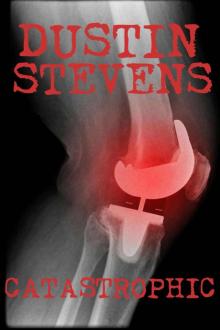- Home
- Dustin Stevens
Fair Trade Page 2
Fair Trade Read online
Page 2
To either side of me, Angelique, Swinger, and Stapleton all remain silent. All three know the way things really played out. The latter two were there and had an active role in it. But nobody says a word to correct me, their own reasoning likely matching my own.
There are more important things at hand than burdening these women with the truth.
“Intentional?” Valerie asks. Her face screws up slightly, some of the confusion from earlier returning to her features. “Mira?”
“So you knew her well?” I ask, seizing on her use of my wife’s first name.
For a moment, there is no response. Valerie simply sits and tries to digest the information, her gaze drifting to the empty table between them as she chews on things. Eventually, she looks up, the skin crinkled around her eyes. “I...I just never would have...”
So badly I want to reach out and grab her by the shoulders. To tell her to look at me, to focus on what I’m saying, to answer the questions I’m throwing her way.
Just as surely, I know I can’t. The news I just shared is a bombshell. The rest of us around the table have spent the better part of a week trying to come to grips with it. This woman has had a few seconds.
“How well did you know her?” I repeat.
Shifting her eyes up to look at me, Valerie shakes her head. “Not well. I’d only met once before, and that was an arranged thing. Nana had never met her.”
“What do you mean, an arranged thing?” Angelique asks, the sound of her voice pulling the attention of both women her way.
Fran remains silent. Behind her, Valerie casts a glance around the table, checking each of us in turn.
“Please don’t find my grandmother rude. She isn’t conversing because she doesn’t understand a word of what’s going on.”
I can see a crease form between Stapleton’s eyes at the comment, the words seemingly coming from far afield.
“Chuukese,” I say, recalling my initial encounter with the woman, standing on her front porch. “I recognized it earlier.”
Valerie’s eyebrows go up slightly. “You’ve been to Micronesia?”
Shaking my head slightly, I motion with my chin toward Swinger. “Jeff and I were stationed in Guam for a while. There’s a large Chuuk population there.”
The crease fades from Stapleton’s brow as she gazes back at Valerie. Behind her, Swinger nods slightly in understanding.
“Oh,” Valerie replies, “so then you’re familiar with the term COFA.”
Before I have a chance to respond, Angelique inserts herself into the conversation. “I’m sorry, I don’t mean to be rude this time, but I’m still not sure what any of this has to do with my question. What did you mean, an arranged meeting?”
Already, I have some idea of where Valerie is going with all this, but I can understand my mother-in-law’s unease. The question she posed was fairly simple, though already I can tell the response is going to be cloaked in layers.
Each one seeming to bring a sense of dread to my core.
“I was introduced to your daughter by a doctor,” Valerie says. “A man named Brendan Hoke that works out of a local clinic in National City.”
Shifting her focus back up to me, Valerie says, “Dr. Hoke is known to kind of be the first stop for COFA migrants coming into the city. People like my Nana here. He gives them a onceover, and if everything is okay, he sends them on their way.
“If not, he puts them in touch with people that might be able to help.”
The answer is circuitous, but fits pretty close with what I was expecting the moment she mentioned COFA.
“People like my Mira,” I whisper.
“Exactly,” Valerie says, nodding slightly. “We were supposed to have all sat down again together last Friday, but...”
She doesn’t finish the sentence. She doesn’t need to.
Chapter Three
Reaching out, Ringer presses the button on the side of his cellphone, illuminating the front screen. Raising his chin just slightly, he peers down his nose at the digital readout across the top of it, white numbers against a plain black background.
“Four minutes after four,” he says, his voice drawing the stares of the few men remaining around the table where he sits.
The place is known as The Wolf Den, a simple bar built on the outskirts of El Cajon, the town itself a jumping off point from the sprawl of San Diego into the desert that comprises the bottom half of the state. Constructed more than two decades before with a very specific clientele in mind, the place serves as the very definition of the phrase no frills.
Made entirely from wood and nails, small creases are visible between the floorboards, years of drying under the southern sun having done its worst. Along one wall, a bar runs the length of the room, waist-high, the front edge rubbed smooth from years of sweaty forearms leaning against it.
Behind it is the same barkeep that has been present since the place opened, the migration of his hair from black to silver the only sign that any time has passed.
Despite the hour, he is still posted behind the bar. In his hand is a dog-eared Louis L’Amour paperback, a pair of spectacles balanced on the end of his nose. Every so often, he glances to the corner, making sure his guests are good, before going back to reading.
Most nights, the place would have closed hours before. It being the middle of the week, the men would have left sometime around midnight, retreating back to their homes in anticipation of whatever they had going the next day.
For some, that is work. For others, a host of different possibilities as varied as the men that congregate there, the largest similarity – in some cases the only similarity – the men have being the leather vests they wear and the motorcycles they ride.
Events of the last week have changed that, though. It has taken what should have been a standard evening and turned the volume up exponentially.
Which is why Ringer, the leader of the Wolves, and his three deputies are still seated in the corner. And the barkeep is still behind the bar.
Just as they all will continue to be for as long as it takes to see things through.
“Any word from our guys yet?” Ringer asks.
Raising his gaze, he glances around the table, opening the floor for discussion.
To his left sits Byrdie, a man that many assumed would ascend to the top when it came open a few years prior. A bit older than Ringer, he is the smallest of the four men present, his entire being carved from cord and tendon. Wearing only a ribbed tank top beneath his vest, his bare arms gleam under the overhead light, every ridge visible beneath the skin.
The hair on either side of his head is shaved down to the scalp, the top and back left long, hanging down his back.
Those things have all been there for years. The newest addition is the fact that the entire left side of his face looks like it has been hit by a city bus. Misshapen and puffy, bruising has already set in, his cheek appearing to have been fractured, an open wound sprouting from the corner of his mouth.
A result of the encounter earlier evening that is a part of what has the men so agitated, he sits in silence, unable to say a word.
Directly across from him is the other half of the team that had been sent out, a man different from Byrdie in every way. Known as Gamer inside the organization, he weighs the better part of three hundred pounds, all of it the sort of dense flesh that could be either muscle or fat.
His head shaved bald, heavy droplets of sweat shine from his scalp, no matter the hour or the cool air floating in through the front swinging doors.
Between them is the third deputy for the organization. Known as Snapper, a mouthful of yellowed teeth juts out from between his lips, altering his appearance and his voice in equal parts.
“The guys are in position,” Snapper says.
Flicking his glance down to the darkened screen of his phone, Ringer says, “It’s after four. Nothing?”
Eighteen hours earlier, Ringer had been approached by a woman that had done business with Mike Lincoln – Linc – a fully
vested member of the Wolves. Known to pay the bills by performing the occasional contract killing, the nature of what the woman had wanted with Linc didn’t much concern Ringer.
What did was the fact that now five days later, his bike was still parked outside The Wolf Den, nobody having seen or heard a word from him.
Offering to pay a handsome fee if the Wolves could finish the transaction that Linc left behind, Ringer had accepted. Not so much because of the money, but because in completing the task, he would also gain access to whoever had likely done in their brother.
An eventuality they cannot, and will not, abide.
In what was supposed to be a simple act, he had sent Byrdie and Ringer. That’s where things had gone sideways, two of his better men having arrived back hours later, one of them beaten badly, the target still very much alive.
“No,” Snapper says. “Last check-in was twenty minutes ago. They’re on the house, but nobody’s come back.”
Grunting, Ringer nods. It makes sense. The target is an elderly woman that doesn’t speak a word of English. Having witnessed what happened, she is likely in the wind, making their task infinitely more difficult.
A fact that every man around the table knows. It doesn’t need to be pointed out.
“Have them stay on it,” Ringer says. “And if they get tired, send somebody else. Sooner or later, these guys have to circle back.”
He doesn’t know that, not for sure anyway, but it beats the alternative of doing nothing. Right now, all they have is an address and a description, a name that may or may not be real.
Where to even start looking for someone like that, especially in a town teeming with illegals, is beyond his best guess.
“Right,” Snapper grunts. He adds a nod, the strain on his features matching that of the men to either side.
“And the two men?” Ringer asks, alluding to the pair that had taken on Byrdie and Gamer. “Anything?”
“Not yet,” Snapper replies, “but it’s a basic neighborhood. Pretty quiet right now.”
This time, it is Ringer’s turn to nod. If anything is going to happen, if anyone is going to return, it won’t be until first light, when they have the added protection of having plenty of witnesses around.
Until then, all they can do is sit and wait.
“Any word from the woman?” Snapper asks, the conversation having devolved to just the two of them, the others sitting in silent shame on either end.
He doesn’t use the woman’s name, nobody but Ringer even knowing it, but he doesn’t need to. Everything started with her arrival the afternoon before, will likely revolve around her until things were done.
“Not yet,” Ringer replies. “I called twice, but it’s four in the morning. Bitch is probably asleep.”
Chapter Four
Elsa Teller is not a dog person. Or a cat person. Or a fish person. Or a believer that a person should ever willingly invite an animal into their home.
Perhaps this belief is based on her own upbringing, her father forbidding it, barely tolerating her making even the tiniest of messes as a young child. Maybe it is the schedule she keeps and the realization that she will never be able to provide a pet with the time and attention they need.
Or, more likely, it is the utter repulsion she feels at the mere thought of having to pick up animal feces or be held captive by the wants and needs of another living thing.
Leaning against the front hood of her Audi, those assorted thoughts and many others like it float through Teller’s mind. Standing with one arm folded across her chest, the other is cocked near the side of her head, morning coffee already in hand.
Despite the first rays of dawn just appearing over the horizon, her face is largely hidden behind mirrored sunglasses. A thin shawl is draped over her shoulders, providing the added warmth that the sleeveless black dress and pumps she wears is lacking.
For most, the time of day would be an exercise in agony, especially given the late hour she was working until the night before. Teller barely notices as she sips at her coffee, the three hours of sleep she got a standard allotment for someone in her line of work.
What wasn’t is the place she is now looking out across, a small dog park on the edge of Mira Mesa. A full city block in length, where many would see a nice swath of grass, a place for children and animals to play, she sees only wasted opportunity.
In a town with the housing market of San Diego, that one piece of ground could hold more than a half-dozen homes, easily topping over five million in total value.
The choice of meeting location is one she could do without, though admittedly there are precious few places private enough to have the type of conversation she is about to. Coffee shops make for great set pieces on television, but in reality they are filled with bored people there for no other reason than to eavesdrop and people watch.
Teller has even less time for them than she does the furry critter currently bounding her way.
Short and fluffy, the dog is charcoal in color save a few strips of white around the mouth and eyes. A pink tongue extends down over his bottom lip as he bounds along, his back end swinging from side to side, pulled along by the wagging stub of a tail.
Stopping just short of her, it presents itself at her feet, waiting for affection of some sort, before realizing there is none to be had and turning back toward its owner.
The woman Teller is actually there to speak with.
“Buddy!” the woman scolds, waddling her way across the grass. “Leave her alone.”
Not bothering to voice that she seconds that opinion, Teller remains pressed flush against the side of the car. She watches as the dog bounds back toward its owner, circling her feet twice, his entire body wriggling with excitement.
“I’m so sorry,” the woman says, coming to a stop in the same spot her pet had been in a moment before. Pausing awkwardly, she lifts either hand a few inches as if she might give Teller a hug before stopping.
Teller doesn’t hug. Especially when the person is carrying a green plastic sack full of dog droppings.
“He just gets excited.”
The woman’s name is Carmella Benitez, a contact Teller put in place more than three years before. A woman in her mid-forties, she is already dressed for work in pink scrub pants and a gray zip-up sweatshirt, her thick hair pulled back into a braid.
“Don’t we all,” Teller replies, barely able to mask the disdain in her voice.
“Thank you for agreeing to meet out here,” Benitez says, moving straight past the subject of her pet. “I appreciate it.”
“No problem,” Teller answers. Compared to the stops she made the day before, this is a bit distasteful, but it could be worse.
It’s not as if she has to have a hand in her purse, wrapped around the grip of her Smith & Wesson Shield 2.0 handgun, just to have a conversation.
“I wanted to stop by and ask you to keep an eye out for Fran Ogo,” Teller says. “There’s been a bit of a setback.”
Her mouth forming into a circle, Benitez takes a moment to process. Once the information seems to align, her eyebrows rise. “Oh.”
“Nothing too bad,” Teller adds, “nothing for you to be concerned with, but if she shows up, give me a call.”
For most of the summer, the crowds had been plentiful. Not Fenway plentiful, with fans waiting outside on Yawkey Way, clamoring to get inside, but certainly enough to fill the majority of the seats at McCoy Stadium. Every night they would show up, bringing with them the sort of energy and excitement that only a minor league crowd could provide.
Families with small children. Young men out to compare themselves to the players, seeing how they measure up. Local sponsors playing random games between innings, ranging from free food giveaways to asking fans to race around the bases.
The Triple-A level was billed as a place to watch the stars of tomorrow play today. Just a phone call away from the big club up the road in Boston, that was conceivably true.
But there was something different to it
as well.
Something that made it far and away the most fun I had ever had playing baseball.
The sun was just beginning to set as I pushed off the top step of the dugout and headed for my spot in left field. A smattering of applause followed me as we took the field for the start of the third, up a pair after posting one in each of the first two innings.
Overhead, the sun was sitting just a few inches above the horizon, promising the banks of stanchion lights overlooking the field would be up and active soon enough. Just after Labor Day, already sunset was beginning to creep forward, the first tiny hints of a chilly breeze popping up from time to time.
Before long, the infamous New England winter would be back, taking summer and baseball away for another year.
And taking me back to Corvallis, an eventuality I could not wait for.
Hopping over the third base line, I jogged out to the spot I had patrolled for the past two months, ever since getting called up from Double-A. Starting the season with a hot hand, I had quickly ascended the ranks, even riding it for my first few weeks in Pawtucket.
In the time since, things had cooled somewhat, though by any stretch of the definition, the season had been a success. So much so that there were some whispers that I might even get invited to spring training with the big club.
Nobody thought I had a shot at making the team just yet, but it would be a solid sign for the future just to be on the same field, an announcement that I had arrived, would be sticking around for as long as they let me.
Reaching the spot of thin grass that denoted where I usually stood, I turned toward center field. A moment later, a long, looping throw came sailing in, my friend Bryce chucking a ball over, keeping us loose.
Catching it easily, I returned it back his way, the movement smooth and easy, one I had done a thousand times before. Back and forth we went through a half-dozen throws each, interrupted only by the voice of the ancient PA announcer, a local institution that had been calling games since before I was born.
“Now batting for Scranton-Wilkes, catcher, Rich Chatman.”

 Liberation Day - A Thorn Byrd Novel
Liberation Day - A Thorn Byrd Novel Fair Trade
Fair Trade The Scorekeeper
The Scorekeeper Wild Fire: A Suspense Thriller (A Hawk Tate Novel Book 6)
Wild Fire: A Suspense Thriller (A Hawk Tate Novel Book 6) Ham
Ham The Partnership
The Partnership Justice
Justice The Subway
The Subway The Promisor: A Suspense Thriller
The Promisor: A Suspense Thriller Home Fire: A Suspense Thriller (A Hawk Tate Novel Book 5)
Home Fire: A Suspense Thriller (A Hawk Tate Novel Book 5) The Bear
The Bear Battle Cry
Battle Cry Warning Shot
Warning Shot Office Visit
Office Visit The Kid: A Suspense Thriller (A Reed & Billie Novel Book 3)
The Kid: A Suspense Thriller (A Reed & Billie Novel Book 3) Hellfire: A Suspense Thriller (A Hawk Tate Novel Book 4)
Hellfire: A Suspense Thriller (A Hawk Tate Novel Book 4) Motive ; One Last Day ; Going Viral
Motive ; One Last Day ; Going Viral The Subway ; The Debt ; Catastrophic
The Subway ; The Debt ; Catastrophic Cold Fire
Cold Fire Dead Peasants (Zoo Crew series Book 2)
Dead Peasants (Zoo Crew series Book 2) Thriller Box Set One: The Subway-The Debt-Catastrophic
Thriller Box Set One: The Subway-The Debt-Catastrophic The Boat Man: A Suspense Thriller (A Reed & Billie Novel Book 1)
The Boat Man: A Suspense Thriller (A Reed & Billie Novel Book 1) The Zoo Crew (Zoo Crew series Book 1)
The Zoo Crew (Zoo Crew series Book 1) Twelve
Twelve The Good Son: A Suspense Thriller (A Reed & Billie Novel Book 2)
The Good Son: A Suspense Thriller (A Reed & Billie Novel Book 2) The Boat Man: A Thriller (A Reed & Billie Novel Book 1)
The Boat Man: A Thriller (A Reed & Billie Novel Book 1) Scars and Stars
Scars and Stars The Glue Guy: The Zoo Crew Series Book 4
The Glue Guy: The Zoo Crew Series Book 4 Four
Four Motive
Motive 21 Hours
21 Hours Krokodil
Krokodil Ohana
Ohana Catastrophic
Catastrophic Just A Game
Just A Game Quarterback
Quarterback Tracer
Tracer Fire and Ice: A Thriller (A Hawk Tate Novel Book 3)
Fire and Ice: A Thriller (A Hawk Tate Novel Book 3) Liberation Day
Liberation Day